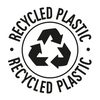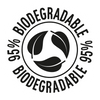Fire up the grill, open a bottle of bubbles and enjoy the last rays of sunshine in the backyard: wonderful! Yet you also know that a barbecue is not the most environmentally friendly option for a nice dinner party with friends. But don't panic: with these tips you can organize a sustainable BBQ this year that everyone will be talking about for weeks!
BARBECUE BAD FOR THE ENVIRONMENT?
You may wonder what is actually so bad for the environment when you turn on that barbecue. And admittedly, we didn't immediately have the answers to that ourselves. That's why we delved into the data this week to get a good overview of the facts about barbecuing and its impact on the environment. What seems? Not only are the harmful substances released during a barbecue bad for the environment and your health, the fuel and the menu you serve also have a major impact on the environment.
THE IMPACT OF FUEL
Climate organization HERE found out how much charcoal the Dutch use per year. This is estimated at around 13 million kilos of charcoal. About 80% of this is produced in an environmentally unfriendly way in South America and Africa. Illegally harvested wood is burned in the open air on a large scale, releasing CO₂ and noxious smoke. It takes 10 kilos of wood to produce 1 kilo of charcoal, and 13 million kilos of charcoal are sold in the Netherlands every year! So there is still a lot of profit to be made. And that brings us directly to the first tip:
TIP #1 CHOOSE SUSTAINABLE FUEL
Fortunately, there are also sustainable alternatives to the bags of charcoal or briquettes that you buy at the supermarket or gas station. For example, consider charcoal with an FSC quality mark. According to the WWF and other environmental organizations, this quality mark guarantees that the charcoal comes from responsibly managed forests and that the safety of workers has been taken into account. This charcoal is also almost always a mix of European wood from deciduous trees such as oak, hornbeam, ash, alder and lime. Another alternative: coconut briquettes, made from the shell of coconuts. Be sure to check the packaging: there are coconut briquettes from Indonesia to which fossil fuels such as paraffin have been added. They are not so environmentally friendly!
THE IMPACT OF HARMFUL SUBSTANCES
Barbecuing on charcoal or briquettes also releases harmful substances, including particulate matter. Not good for the planet, but certainly not for your health! The smoke can cause health problems, especially in people with respiratory conditions such as asthma. To prevent smoke development and release fewer harmful substances, fortunately there are alternatives to the old-fashioned charcoal barbecue. That's what the second tip is about:
TIP #2 SWITCH TO ELECTRIC OR GAS
It may take some getting used to, but barbecuing on gas or electricity is healthier and causes less inconvenience. These barbecues do not require charcoal or briquettes. This means you don't have to worry about whether the fuel in your barbecue is sustainable, and no harmful substances are released. It is possible that smoke is released because some fat ends up on the barbecue, but you can solve this by placing a fat collection plate underneath.
THE IMPACT OF MEAT
For many people, barbecuing means meat. Lots of meat. But did you know that the meat industry has a huge ecological impact? Figures from the RIVM show that beef products cause the most CO2 emissions. Chicken scores a lot better, but a meat substitute, vegetables or potatoes are even less damaging to the environment. More than 30 kilos of CO2 are emitted per kilo of beef steak, while for chicken this is 9.6 kilos of CO2. A kilo of salmon produces almost 7 kilos of emissions, and a kilo of zucchini almost 3. Let that sink in for a moment. In addition, eating a lot of meat is also not good for your health. High time to adjust the standard barbecue menu! Which brings us to the third tip:
TIP #3 ENVIRONMENTALLY FRIENDLY MENU
No worries, a sustainable barbecue does not necessarily mean a vegetarian barbecue. A conscious barbecue. So if you like meat on the grill, you can reduce the environmental impact by eating less meat during the barbecue. It is also a good idea (if you put meat on the barbecue) to choose responsible fish and meat with a low environmental impact. Supplement the menu with vegetables, meat substitutes, fresh salads and fruit. And finally: an environmentally friendly menu also means a menu with normal portions. Don't make too much food, because anything you don't eat ends up in the waste bin. Prevent food waste by not buying too much and putting anything left over in containers in the refrigerator so you can eat it the next day.
CLEAN THE BARBECUE WELL
A sustainable barbecue also means that you do not have to buy a new barbecue every year. Your barbecue will last longer if you keep it clean. And we all know that it will be a mess if you don't clean the barbecue until a day later, so go ahead and put that drink aside after dinner to soak the grill in soapy water. Make a solution of all-purpose cleaner and lukewarm water and lubricate the grill using a sponge. Then place the grid in the grass overnight. Because the grass is often damp, you can easily brush off all the dirt the next morning or rub it with a sponge. Don't have grass nearby? Then leave the rack in the soapy water.
INVITED TO A BARBECUE OR DINNER PARTY?
Give the host of the dinner (even if it is you) a Dinner Package as a gift! For all those plates that you have just enjoyed, the glasses that cannot actually go in the dishwasher, those stains on the tablecloth, the many visits to the toilet, the dirty hands after you secretly took the leftovers from the pan: Marcel's Diner Package offers outcome. Cleaning after a nice dinner almost becomes a party. And you also give the environment a gift!










